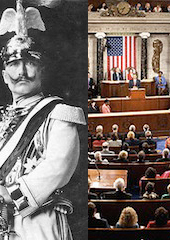U.S. Debt Ceiling and Default? Blame the Germans!
Why not use the historical roots of the debt ceiling to shift the blame?
September 30, 2013

The United States is again in the political grips of what seems like the budgetary equivalent of another self-destructive death march to Bataan. High time to engage in the nation’s favorite political sport – assigning the blame.
It would be far too easy and obvious to blame the Republicans in the U.S. House of Representatives, as tempting as that is, given their extreme political intransigence.
You see, the fact that Americans and global financial markets are once again staring at the abyss of default ultimately is all the Germans’ fault. You heard that right. The reason why the situation of breaching the debt ceiling even arises is due to the warring machinations of the Germans.
To see how this plays out, let’s start with the important observation that setting a debt ceiling is highly uncommon globally. Why then did the United States resort to it?
Generations back, the Germans made them do it. Here is why.
World War I was, as you may recall from the history books, largely a European war, pitting Germany, Austria-Hungary and Turkey against Britain, France, Russia and Italy. When the war began in 1914, U.S. President Woodrow Wilson, representing the will of the vast majority of the people of the United States, promised neutrality.
However, the German navy, with its submarines, managed to cut Britain off from supplies. This effective blockade led to the sinking of two U.S. steamers off the British coast in February 1917. President Wilson broke off diplomatic relations with Germany and, after receiving Congressional authorization, declared war on the Kaiser on April 6, 1917.
Now, as we know all too well, wars cost money. U.S. involvement in World War I was no different. And as far as most wars are concerned, they are not budgeted. President Wilson had to borrow money to fund U.S. troops in their fight against Germany, but this was politically and administratively troublesome.
Why? Because every single time Wilson went to the markets to issue more debt, he had to ask Congress for approval.
A Congressional stroke of genius
So, Congress had a stroke of genius. So that the President would not have to return each time to beg for more, why not do the patriotic thing and give him the ability to borrow a fair number of times? So that things would not get out of hand, the proposal to set a debt ceiling was enacted.
And so, with the approval of the Second Liberty Bond Act in October 1917, a patriotic-minded U.S. Congress loosened the nation’s debt issuance purse strings and basically created what we refer to today as the debt ceiling.
But Germany’s guilt for the U.S. predicament of today does not end there. The Second Liberty Bond Act also contained the so-called gold clause. Its effect was that these war bonds had to be redeemed in gold. And yet, U.S. gold reserves were far too small to make good on that promise.
Thus, some decades later, the U.S. Congress upon the request of President Franklin D. Roosevelt revoked the clause in 1933 retroactively. Coincidentally, many (including four of nine Supreme Court Justices in 1935) consider that action as the first U.S. debt default. Again, thanks to the Germans!
So here is our golden escape clause for today’s U.S. Congress: Instead of the two major parties doing the usual thing, i.e., blaming each other, why not engage in an unusual maneuver?
Instead of endlessly debating whether the United States should honor its financial commitments or not, the distinguished Members of Congress could resort to approving a joint resolution of both Houses. That resolution would condemn the Germany of 2013 for its undeniable responsibility nearly a century ago in triggering the existence of the debt ceiling in the first place.
That way, the Congress, in solemn bipartisan fashion, could wipe its hands of any responsibility for today’s conundrum and place the blame where it properly belongs, with the Germans.
Case closed.
Takeaways
That Americans and global financial markets are again staring at the abyss of default is all the Germans’ fault.
Instead of blaming each other, the parties in Congress could condemn 2013 Germany for its acts 98 years ago.
In 1917, the U.S. Congress loosened the nation’s debt issuance purse strings and created the debt ceiling.
Every single time Wilson went to the markets to issue more debt, he had to ask Congress for approval.
Read previous

Elon Musk: The Next Henry Ford?
September 29, 2013
